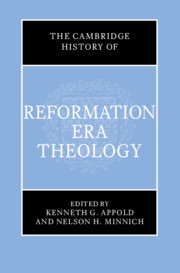Book contents
- The Cambridge History of Reformation-Era Theology
- The Cambridge History of Reformation-Era Theology
- Copyright page
- Contents
- Figures
- Acknowledgments
- Contributors
- Abbreviations
- Introduction
- Part One Theology in an Age of Cultural Transformation
- Part Two Schools and Emerging Cultures of Theology: Diversity and Conformity within Confessions
- 10 The Faculty of Theology of Paris (1474–1682)
- 11 The School of Salamanca
- 12 The Schools of Louvain and Douai: The Bible, Augustine, and Thomas
- 13 The Jesuit School of Theology
- 14 Theological Currents in Latin America (Sixteenth Century)
- 15 Diversity and Conformity within Early Lutheranism
- 16 Reformed Schools of Theology
- 17 Cultures of Theology in the British Isles
- 18 Radical and Dissenting Groups
- 19 Christian Ecumenical Efforts
- 20 Western “Confessions” and Eastern Christianity
- Part Three Topics and Disciplines of Theology
- Index
- References
19 - Christian Ecumenical Efforts
from Part Two - Schools and Emerging Cultures of Theology: Diversity and Conformity within Confessions
Published online by Cambridge University Press: 27 September 2023
- The Cambridge History of Reformation-Era Theology
- The Cambridge History of Reformation-Era Theology
- Copyright page
- Contents
- Figures
- Acknowledgments
- Contributors
- Abbreviations
- Introduction
- Part One Theology in an Age of Cultural Transformation
- Part Two Schools and Emerging Cultures of Theology: Diversity and Conformity within Confessions
- 10 The Faculty of Theology of Paris (1474–1682)
- 11 The School of Salamanca
- 12 The Schools of Louvain and Douai: The Bible, Augustine, and Thomas
- 13 The Jesuit School of Theology
- 14 Theological Currents in Latin America (Sixteenth Century)
- 15 Diversity and Conformity within Early Lutheranism
- 16 Reformed Schools of Theology
- 17 Cultures of Theology in the British Isles
- 18 Radical and Dissenting Groups
- 19 Christian Ecumenical Efforts
- 20 Western “Confessions” and Eastern Christianity
- Part Three Topics and Disciplines of Theology
- Index
- References
Summary
The search for the truth and establishment of consensus through the exchange of viewpoints was a common means of reaching understanding in the early modern period.1 The roots of this process lay in the way in which academic disputations were conducted in the medieval university. It followed firmly established rules, rhetorical models, and techniques. These standard forms of communication were carried over onto a nonacademic, public plane in early modern decision making and formation of public opinion. There the forms of the medieval academic disputation and judicial structures for negotiations blended with each other. The religious divisions that proceeded from the Reformation and the medieval church’s inability to reform provided the impetus for this development. The struggle for correct doctrine, which employed the form of the disputation with theses and antitheses, moved ever more out of the academic realm. That certainly did not end the culture of disputation at the university, within learned circles, however. Instead, a form of exchange, discussion, and dialogue in the vernacular took its place alongside it in the forum of the nonacademic public.
- Type
- Chapter
- Information
- The Cambridge History of Reformation Era Theology , pp. 372 - 384Publisher: Cambridge University PressPrint publication year: 2023

